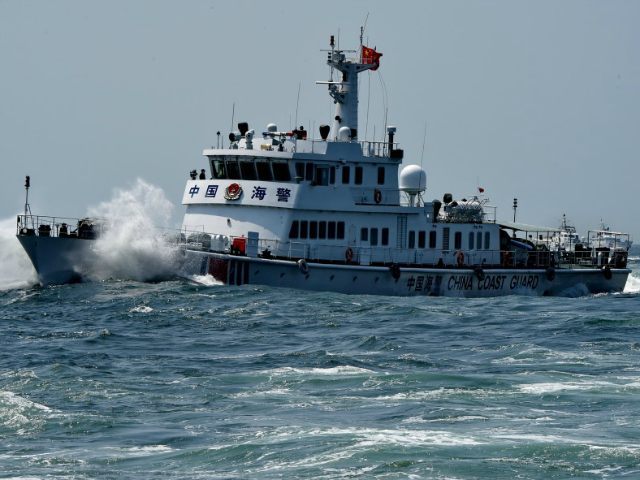After a dramatic incident at sea that resulted in the arrest of a Chinese fishing crew trespassing in the waters of Indonesia, China protested Indonesia had no right to intervene on what has long been a “traditional Chinese fishing ground.”
The South China Sea waters in dispute are widely considered Indonesian sovereign territory.
On Saturday night, Indonesian authorities intercepted a Chinese ship in their territory — little more than 4 kilometers from the Indonesian Natuna Islands. Authorities boarded the ship and arrested eight men aboard, tying the fishing boat to their own in order to bring it back to Indonesia for an investigation.
Before they could, the Chinese Coast Guard arrived and began ramming the fishing boat, the New York Times explains, as a way to “compel the Indonesian authorities to release it.”
“We want to avoid a much more serious incident, so we settled on just arresting the eight crew members. The ship got away but we have the eight men in custody to help us investigate this incident,” Indonesian Minister of Fisheries and Maritime Affairs Susi Pudjiastuti explained, arguing that fighting the Chinese Coast Guard to keep the ship would have made for a much more dramatic scene. She nonetheless called the intervention on the part of the Chinese authorities “arrogant.”
Indonesia has summoned the Chinese ambassador in Jakarta, however, demanding China return the ship. “At the meeting we conveyed our strong protest [over] the breach by the Chinese coastguard of Indonesia’s sovereign rights,” Indonesian Foreign Minister Retno Marsudi told reporters after the meeting. Of the incident, Fisheries Minister Susi said, “We respect China, but we must also maintain our sovereignty.” Indonesian Defense Minister Ryamizard Ryacudu left room for error, telling reporters that the coast guard officials may not have been acting on government orders: “Soldiers often have disciplinary problems, probably that is the case [with Chinese coastguard officials]… Which is what we will try to clarify from Chinese [embassy] officials.”
The Chinese Foreign Ministry rapidly made clear, however, that while China considers the Natuna Islands properly a part of sovereign Indonesia, the waters surrounding it should be free for China to exploit. “The Chinese fishing vessel was conducting its regular operation when chased by an armed Indonesian vessel… it is hoped that the Indonesian side could properly handle this issue” Chinese embassy spokesman Xu Hangtian said of the incident. Chinese Foreign Ministry Spokeswoman Hua Chunying was more direct, calling the Natuna’s waters “traditional Chinese fishing grounds” and demanding Indonesia release the fishermen arrested. Indonesia has responded negatively to the assertion that the fishing vessel did not break the law.
“With what took place yesterday, we feel our years-long efforts and work to promote peace in the South China Sea were interrupted and sabotaged,” Susi said, urging China to “show goodwill and return the boat.”
The incident recalls several in which Chinese coast guard vessels have taken to ramming other ships to assert themselves in the sea. Vietnam has been the most prominent victim of this tactic. On multiple occasions, Vietnamese fishing ships traveling through Vietnam’s Paracel Islands have been the victims of a Chinese vessel attack. In the latest incident this October, Chinese ships sunk a Vietnamese fishing water in Vietnamese waters — waters China claims as its own in the South China Sea. Vietnam is one of five nations contesting China’s claims in the South China Sea, along with the Philippines, Malaysia, Brunei, and Taiwan. Japan and East Timor have added their voices to the international community concerned with Chinese expansionism in the region.
China has had significantly less success with this technique outside of the South China Sea. In an incident last week, Argentine law enforcement found an Chinese vessel illegally fishing in Argentine waters. Argentina’s Coast Guard reported that the ship attempted to ram itself into Argentine vessels, attacking law enforcement. Argentina sunk the ship, and the Chinese government has lodged a protest.
Indonesia has previously expressed concern over China’s maritime belligerence, particularly in the South China Sea. “We would like to see a solution on this in the near future through dialogue, or we could bring it to the International Criminal Court,” Indonesia’s Coordinating Minister of Political, Legal, and Security Affairs Luhut Panjaitan said of the South China Sea dispute in November, meaning the Permanent Court of Arbitration at The Hague. The remark was notable because Indonesia and China do not have any overlapping maritime claims; foreign ministry spokesman Hua clarified that China does not dispute Indonesia’s sovereignty over the Natuna Islands even as it defends Chinese ships that trespass there.
Minister Susi asserted that Indonesia may take China to court over the incident this weekend. “We may take it to the international tribunal of the law of the sea,” she said.

COMMENTS
Please let us know if you're having issues with commenting.